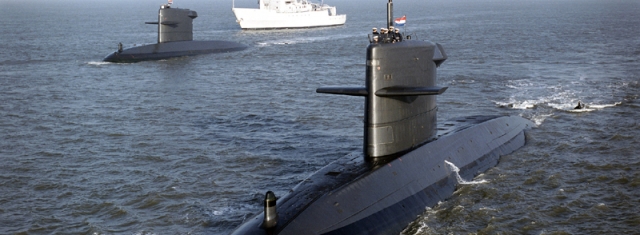Politics
European defense: the Dutch emerging as key players
European defense and Nederlands

2 walrusklasse onderzeeboten (Source: Royal Netherlands Navy / Koninklijke Marine)
USPA NEWS -
The strategic landscape shift which occurred at the end of the cold war shows signs of receding, as Russia restores its military power. Overstretched with several engagements in the Middle East, NATO needs more than ever to rely on European allies to guard the old continent, aware that Russia will use the power void to restore its former presence, namely through the increase of submarine activity. The Netherlands are answering the call.
It is no wonder why both world wars erupted in the old continent: at the intersection between worlds, home to all former colonial powers, Europe is a stronghold. But the large American military presence which characterized the Cold War era has been depleted by years of military engagement in many countries, far abroad. Iraq, Afghanistan, Kuwait, Syria“¦ The US military currently deploys almost half a million troops abroad. Seizing the opportunity of the collapse of the Soviet Union, the United States completed its large network of military bases around the world by infiltrating the former soviet bloc. But new post-9/11 operations drafted thousands of troops overseas, leaving largely the old European fortress unguarded. Politico reporter David Vine says (1): “Hundreds of bases in Europe have closed since the 1990s, but the base and troop (11,500) presence in Italy has been relatively constant. Recently, the military has built new bases and expanded Africa-focused operations in Sicily.“
After recovering from the initial shock of the economic collapse, Putin-run Russia quickly started working on restoring its military power, a process which is, today, well advanced, according to experts. Jeremiah Jacques, strategist for the Trumpet, writes (2): “For a decade after the fall of the Soviet Union in 1991, Russia was depleted, defeated, and outside the mainstream of world affairs. But Vladimir Putin became president in 2000, and since then, Russia has changed dramatically.“ And one of the most promising ways to get back discreetly into Europe is by controlling its waters: massive financial efforts have been consented by Russia to get back on its underwater feet. Military expert Steven Pifer says (3): “Russia is modernizing the three legs of its strategic triad. It is procuring eight Borei-class ballistic missile submarines (SSBNs) and is halfway through a ten-year program to build four hundred intercontinental ballistic missiles (ICBMs) and submarine-launched ballistic missiles (SLBMs).“
Russia is aware, as Germany was before it, that control of coastal waters is paramount to control Europe. The recent shutdown (4) of the Sukhoï 57, deemed unable to match the new American 5th-generation fighters, told Russians that fighting for the skies in Europe was hardly feasible. A large, unnoticed, and powerful submarine presence all around, from the Bering strait to the Arctic waters is therefore considered the best way to counterbalance the American mesh of military bases all over Europe.
The Dutch, over the years, have proven exceptional allies within the NATO alliance, and have provided valuable assistance in all types of missions, from intelligence gathering to anti-piracy missions (5) off the coast of Somalia. The Dutch submarine fleet is relatively small, comprising a mere 4 Walrus-class diesel-electrics designed in the 80´s. But there particularly advanced design at the time of their construction, combined with skillful use, have enabled the Netherlands to be considered a submarine force to be reckoned with, a rock in the Russian shoe. In November of 2016, a Dutch vessel was able to get within firing range of the only Russian aircraft carrier, the Admiral Kuznetsov, giving the Russians a serious scare. The BBC reported (6): “Russia's defence ministry says two of its navy destroyers forced away a Dutch submarine to stop it spying on an aircraft carrier in the Mediterranean. The sub was 20 km (12 miles) from the Admiral Kuznetsov at the time of the incident, the military said.“ Though the Russian rhetoric claimed the incident proved that Russians could easily detect Dutch subs, it is unthinkable for any carrier to let an attack submarine so close.
The Hague knows, however, that facing Russia, the Netherlands need to step up their game and increase capacity. The United States have been advocating for a more solidly-funded, modernized defense in Europe, for many years, although current president Trump recently upped the rhetoric. The American view is that it would be foolish to conclude, from the absence of conflict in Europe, that the strategic setting is secure: Russia is indeed on the path to recovery. Germany and the UK (7), two of Europe´s historical powers, have armed forces in pitiful condition - Germany actually has no submarine capacity whatsoever, for lack of seaworthy vessels.
The Netherlands, to expand their already-crucial role in Europe´s defensive chess board, therefore need to increase their capacity. The decision was made to replace the aging Walrus-class subs, with more modern units. NL Times Janene Pieters writes (8): “Defense wants at least four new submarines and put 2.5 billion euros aside for that purpose in its multi-year budget. The next cabinet will make a decision on the purchase.“. The number and type are yet unknown, but Ank Bijleveld, Dutch minister of defence, will need to choose its supplier wisely : it will not be home-built (the Netherlands no longer has the appropriate shipyards for such a construction), and German shipyards are in such condition (9) that the ships they issue are unseaworthy.
To confirm their place as a key player, The Hague will need more, better, and bigger. Although the NATO military budgets continue to dwarf Russian ones, and recent technological challenges have been won by the West, Russia shows no sign of giving up the struggle, and has been gaining steady ground.
1)https://www.politico.com/magazine/story/2015/06/us-military-bases-around-the-world-119321
2)https://www.thetrumpet.com/15647-russias-return-to-superpower-status
3)http://nationalinterest.org/feature/pay-attention-america-russia-upgrading-its-military-15094
4)http://www.businessinsider.fr/us/russia-admits-defeat-su-57-not-going-into-mass-production-2018-7
5)https://www.bbc.com/news/10382470
6)https://www.bbc.com/news/world-europe-37928222
7)https://www.theguardian.com/uk-news/2017/dec/19/royal-navy-teething-troubles-hms-queen-elizabeth-quiz
8)https://nltimes.nl/2016/03/16/security-agency-dutch-submarines-needed-intelligence-gathering
9)https://arstechnica.com/information-technology/2018/02/german-navy-experiences-lcs-affect-in-spades-as-new-frigate-fails-sea-trials/
1)https://www.politico.com/magazine/story/2015/06/us-military-bases-around-the-world-119321
2)https://www.thetrumpet.com/15647-russias-return-to-superpower-status
3)http://nationalinterest.org/feature/pay-attention-america-russia-upgrading-its-military-15094
4)http://www.businessinsider.fr/us/russia-admits-defeat-su-57-not-going-into-mass-production-2018-7
5)https://www.bbc.com/news/10382470
6)https://www.bbc.com/news/world-europe-37928222
7)https://www.theguardian.com/uk-news/2017/dec/19/royal-navy-teething-troubles-hms-queen-elizabeth-quiz
8)https://nltimes.nl/2016/03/16/security-agency-dutch-submarines-needed-intelligence-gathering
9)https://arstechnica.com/information-technology/2018/02/german-navy-experiences-lcs-affect-in-spades-as-new-frigate-fails-sea-trials/
Liability for this article lies with the author, who also holds the copyright. Editorial content from USPA may be quoted on other websites as long as the quote comprises no more than 5% of the entire text, is marked as such and the source is named (via hyperlink).






